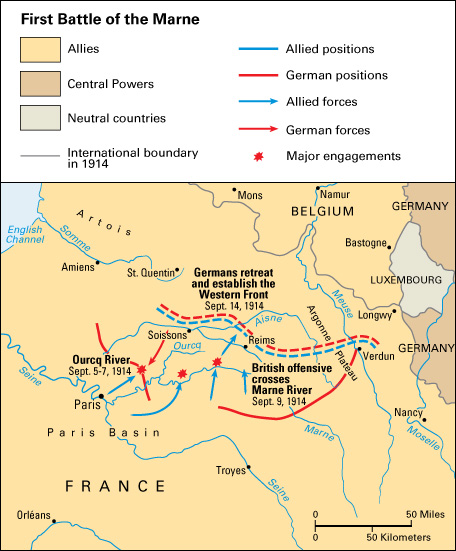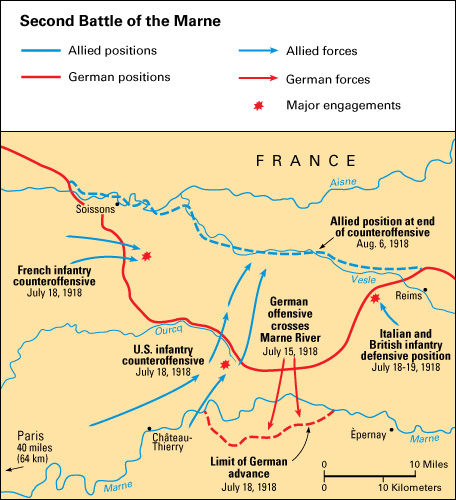Marne, Battles of the, were two important battles fought along France’s Marne River during World War I (1914-1918). In the first battle, French and British troops stopped a German advance near Paris in the early weeks of the war. In the second battle, Allied and American forces broke the final German offensive of the war. The Marne is the largest branch of the Seine River.
First Battle of the Marne.
The fighting in World War I began in August 1914. Germany invaded France, pushing within 30 miles (48 kilometers) of Paris. On September 5, French troops attacked German positions near the Ourcq River, a tributary of the Marne. The Germans then counterattacked, forcing the French back. On September 7, thousands of reserve soldiers rushed from Paris to the battlefield in taxis. The reserves strengthened the line, halting the German advance. On September 9, British troops crossed the Marne from the south and moved into a gap between two German armies. The threat posed by advancing British and French troops forced the Germans to retreat behind the Aisne River, more than 60 miles (96 kilometers) from Paris. The Germans dug in, preparing trenches that would last to the end of the war.

The Allied stand at the Marne prevented the Germans from taking Paris at the start of the war. It also began nearly four years of brutal trench warfare (fighting from fortified ditches). The French and Germans each suffered around 250,000 casualties (soldiers killed, wounded, or captured) in the First Battle of the Marne. About 12,000 British troops were killed or wounded.
Second Battle of the Marne.
On July 15, 1918, Germany launched its final offensive of the war, crossing the Marne east of Paris. French troops supported by American, British, and Italian forces stopped the German advance. On July 18, the Allies mounted a strong counteroffensive and drove the Germans back. The Allied attack stopped on August 6. France suffered 95,000 casualties in the Second Battle of the Marne. About 170,000 German troops were killed, wounded, or taken prisoner. The British and Americans lost a total of about 25,000 troops.

The Allied victory at the Second Battle of the Marne again saved Paris. It also set the stage for the final Allied offensives of World War I.
See also German Spring Offensive; World War I.
